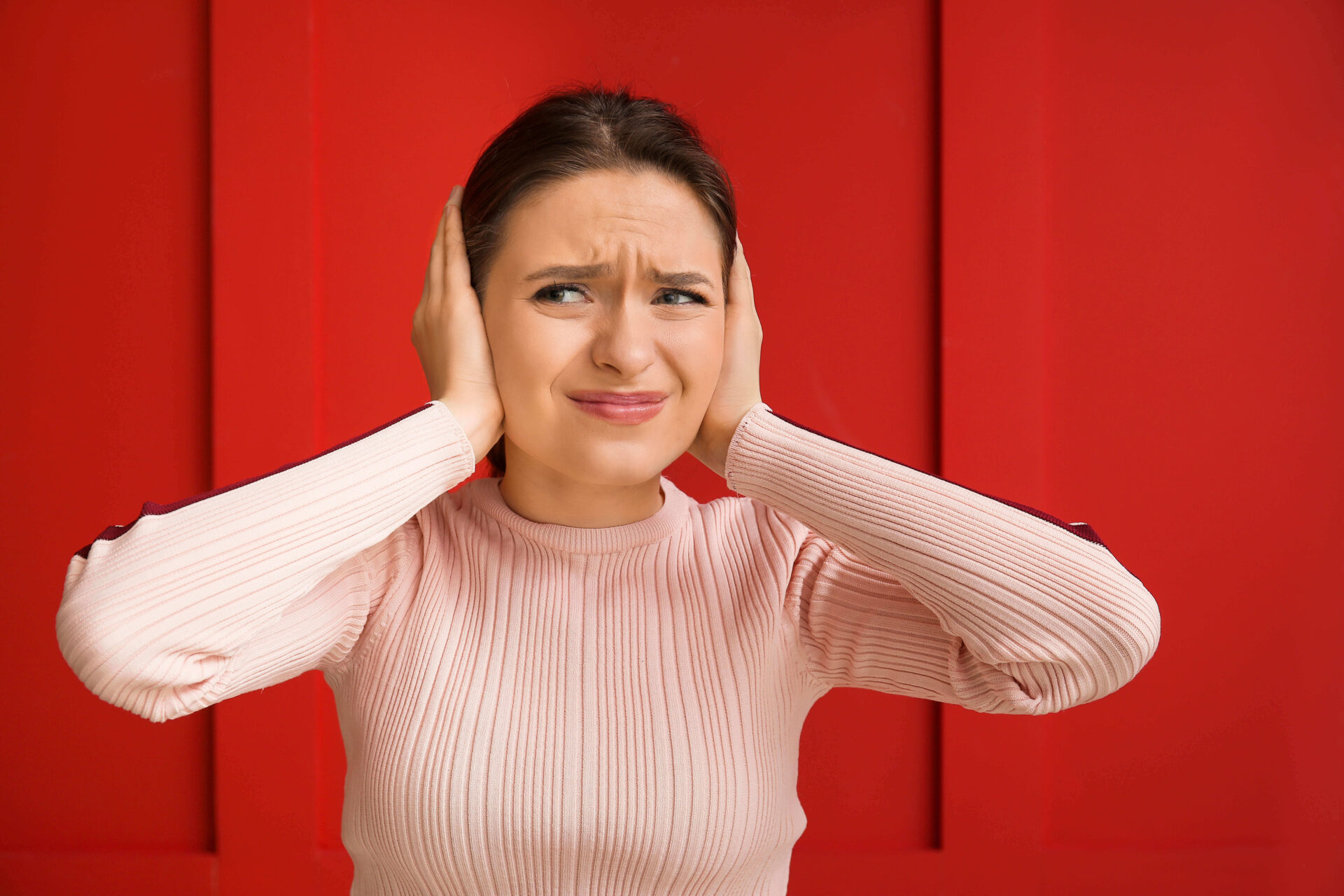Hyperacusis FAQs
If you or someone you care about is living with hyperacusis or misophonia, please direct them to this hyperacusis FAQs page. These are the most common questions concerning hyperacusis, hyperacusis symptoms, and hyperacusis treatment. Learning more about hyperacusis can help in educating others or even communicating with a loved one about hyperacusis. This page should help you better understand hyperacusis, why it occurs, and how to treat it.
COMMON HYPERACUSIS FAQS
What is hyperacusis?
Hyperacusis is hypersensitivity to normal levels of sound, or a reduced tolerance to sounds in general. People with hyperacusis often find normal environmental sounds uncomfortably loud or even painful. This can vary in severity and may significantly impact a person’s quality of life, making them feel anxious or stressed in noisy environments.
What causes hyperacusis?
Hyperacusis is most commonly caused by damage or changes to the inner ear, such as found with aging and noise exposure. Hyperacusis, affects individuals across all age groups. It can impact hearing in one or both ears. The causes of hyperacusis encompass a range of factors, including:
- Multiple Sclerosis
- Temporomandibular joint (TMJ) disorder
- Tay-Sachs disease
- Post-Traumatic Stress Disorder (PTSD)
- Williams syndrome
- Ménière’s disease
- Systemic lupus erythematosus (SLE)
- Airbag deployment
- Head injuries
- Migraines
- Lyme disease
- Viral infections affecting the inner ear or facial nerve
- Ear damage resulting from toxins or medication
- Loud noise exposure
- Bell’s palsy
Additionally, hyperacusis may also be associated with certain neurological conditions such as autism or cerebral palsy in children, as well as brain injuries in pediatric cases.
While the precise cause of hyperacusis remains elusive, research theories suggest potential factors such as malfunctioning of the ear’s protective mechanisms, damage to specific parts of the auditory nerve, abnormalities in the central processing system, or dysfunction of the auditory nerve itself.
Does hyperacusis go away?
Hyperacusis does not go away but can be managed by making loud sounds comfortable with compression technology in prescription hearing instruments. The reason hyperacusis does not typically “go away” on its own because of the underlying damage that is typically associated with it; however, each case is unique and a professional trained in decreased sound tolerance (i.e., an Audiologist) is best to seek advice and treatment from once any underlying medical condition is ruled out.
Is hyperacusis a disability?
Hyperacusis may be considered a disability if it impacts a person’s ability to tolerate everyday sounds; however, hyperacusis is generally treatable to improve a person’s range of sound tolerance and lessen the impact it has on the person experiencing it.
How to treat hyperacusis?
Hyperacusis is treated differently depending on its severity and the extent of changes to the inner ear. Some people with reduced sound sensitivity may only need compression, or the lowering of loud sounds to a comfortable level, with digital technology in a prescription hearing device, while others may need more support, such as Cognitive Behavioral Therapy (CBT) to change their thoughts and behaviors around sounds in their daily enviornments.
How does a person with hyperacusis act?
A person with hyperacusis typically avoids loud sounds or environments where even moderate levels of sound bother them (restaurants or a crowded public places). They often overuse hearing protection even when sounds are at safe levels because their auditory system and brain are not processing sound levels correctly.
How to cure hyperacusis?
There is no cure for hyperacusis because there is no cure to inner ear damage at this point in time. There are ways to manage the symptoms and help reset how the brain classifes different levels of sound.
Is hyperacusis permanent?
Hyperacusis is generally considered permanent because there is no cure to the underlying inner ear damage that most people experience with it; however, the severity of the hyperacusis can be reduced so that only loud sounds (80 dB+) are uncomfortable, similair to how people with no ear damage would respond to them.
Can anxiety and stress cause hyperacusis?
Anxiety and stress does not typically cause hyperacusis but it can add to the sensitivity that people with hyperacusis experience. An over-active nervous system can cause a hightened alert to all inputs, including sound. Thus, anxiety and stress can serve as hyperacusis triggers for increased sensitivity to sound.
Can an ear infection cause hyperacusis?
An ear infection will not cause hyperacusis because fluid behind the ear drum will serve to muffle sound. If the ear infection goes untreated for a long duration, once it is resolved a person could experience temporary hyperacusis until the brain recalibrates to everyday levels of sound again. In essence, the fluid acts like an earplug altering the brain’s perception of sound levels until it clears. The longer it takes to clear, the more likely someone could experience hyperacusis. Without inner ear damage, this type of hyperacusis should resolve over time.
Can hyperacusis be temporary?
Hyperacusis can be temporary if there is no underlying inner ear damage and the brain is just needing time to reset its percpetion of normal loudness levels.
Can hyperacusis cause hearing loss?
Hyperacusis does not cause hearing loss, but hearing loss can be the direct cause of hyperacusis. In other words, damage to the inner ear that results in hearing loss and the abnormal perception of soft, average, and loud levels is what causes hyperacusis.
Can hyperacusis cause tinnitus?
Hyperacusis does not cause tinnitus, although they both can be the result of inner ear damage that changes how the brain processes sound.
Can hyperacusis come and go?
No, tinnitus does not cause hearing loss. However, tinnitus is commonly a symptom associated with hearing loss. If you begin to experience tinnitus and you’re not sure why, schedule an appointment with an Audiologist. With a thorough hearing test and examination, they can diagnose whether or not you’re also experiencing hearing loss.
Why does Bell’s Palsy cause hyperacusis?
Nerve damage associated with Bell’s Palsy can contribute to hyperacusis, especially since the facial nerve and the auditory nerve are in close proximity to each other and both exit the base of the skull near the base of the ear (at the stylomastoid foramen).
Can TMJ cause hyperacusis?
TMJ and hyperacusis can occur together most likely due to the proximity of these anatomical structures and the muscles innervated by the trigeminal nerve. Treating TMJ may help reduce the symptoms of hyperacusis, but inner ear damage should also be ruled out as a contributing factor as well.
Do I have hyperacusis?
If you are unsure if you have hyperacusis, and Audiologist can perform loudness discomfort levels under headphones to determine if you experience this symptom or not. Loudness discomfort levels may not be routinely checked during a hearing test unless loudness sensitivity is mentioned as a possibly symptom the patient is experiencing. Below is a Hyperacusis Impact Survey to determine if your symptoms are clinically significant or not. The higher the score, the more distressing the hyperacusis typically is for a patient.
How to treat hyperacusis at home?
To treat hyperacusis at home, you would need to gradually reintroduce normal sound levels to help desensitize the nervous system in a controlled environment. With the help of an Audiologist trained in hyperacusis, they can provide home exercises to gradually progress through slow increases in sound levels that help reset the auditory system in the brain. If hearing loss exists, this should be done in conjunction with prescription amplification that can amplify soft sounds and keep loud sounds comfortable.
Is hyperacusis a mental illness?
Hyperacusis is not a mental illness. It does involve multiple systems in the brain and typically starts with changes to the inner ear or auditory nerve.
Is hyperacusis a neurological disorder?
Hyperacusis is not a neurological disorder but it is typically associated with an audiological disorder, such as hearing loss and tinnitus (ringing in the ears).

Is hyperacusis a sign of autism?
A common symptom of autism is hypersensitivity to sensory inputs, including sensitivity to sound.
Is hyperacusis dangerous?
Hyperacusis is not dangerous, other than it being potentially debilitating if a person can not tolerate being in public or with other people due to the severity of the symptoms. Due to the potential impact on a person’s quality of life, hyperacusis should not be ignored so that it does not become debilitating for the person experiencing it.

What are the symptoms of hyperacusis?
Symptoms of hyperacusis would be avoiding certain people, places, or events because of fear of feeling uncomfortable or even pain when in normal levels of sound. People with hyperacusis often overuse hearing protection in an attempt to deal with this feeling; however, overuse of earplugs will only heighten the over-sensitivity and make the symptoms progressively worse over time. Hyperacusis symptoms consist of avoiding everyday sounds, such as wearing earplugs when in normal loudness levels (i.e., a grocery store). Others show hyperacusis symptoms by completely avoiding certain places, people, or events due to feeling too uncomfortable (or even pain) when others are not bothered by the same sounds or levels of sound(s).

What does hyperacusis feel or sound like?
Hyperacusis feels like being uncomfortable with normal levels of sound, and possibly even feeling pain when certain levels or pitches of sound are heard to the person experiencing it. Hyperacusis does not sound like anything. Instead, it is a nervous system reaction where normal levels of sound seem exceptionally loud or even painful for the person with hyperacusis.
What medications cause hyperacusis?
Any medication that is ototoxic could cause permanent damage to the inner ear and subsequent hyperacusis.
What triggers hyperacusis?
Hyperacusis is most often triggered by damage or changes to the inner ear structures or auditory nerve. Damage to the auditory nerve is one cause of hyperacusis, which typically happens due to loud noise exposure or aging.
Hyperacusis FAQs
Many of our patients have questions about hyperacusis, and we have tried to answer the most common ones in this list, but perhaps we didn’t answer your question. If you have any additional questions about hyperacusis, don’t hesitate to reach out to our team of audiologists and healthcare professionals. For more information or to discuss these hyperacusis faqs further, don’t hesitate to contact Sound Relief Tinnitus & Hearing Center today.
Learn More: Hyperacusis | Hyperacusis Impact Survey | What is Misophonia?